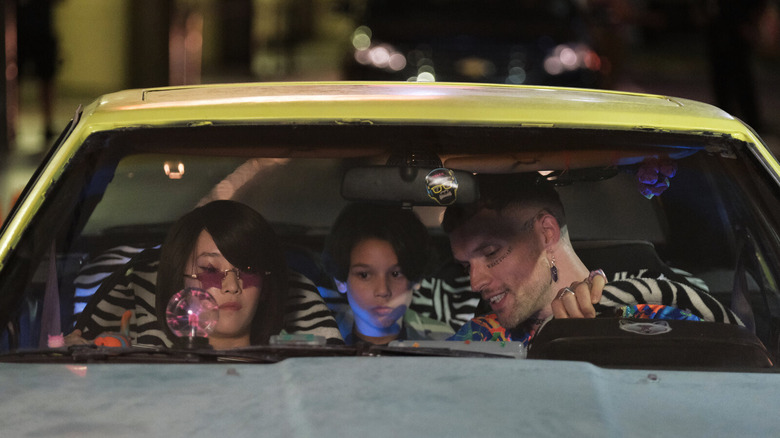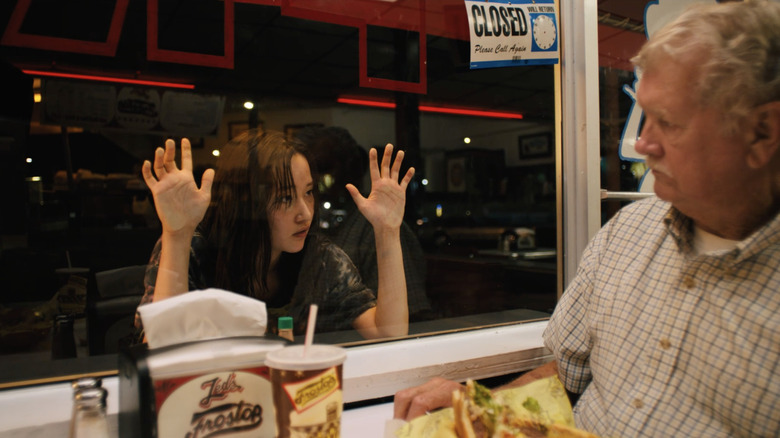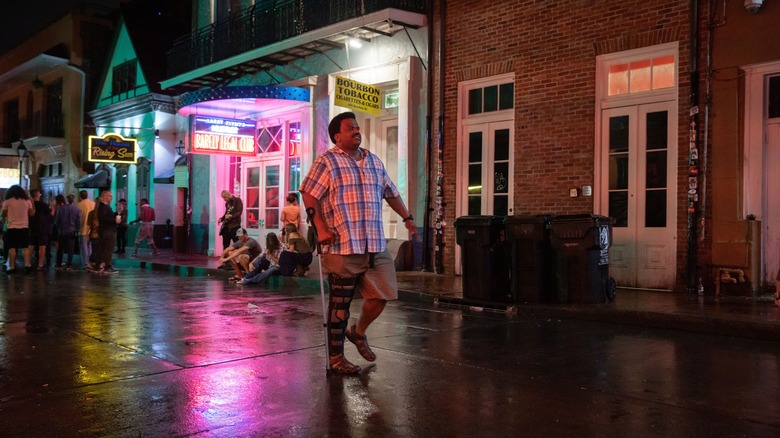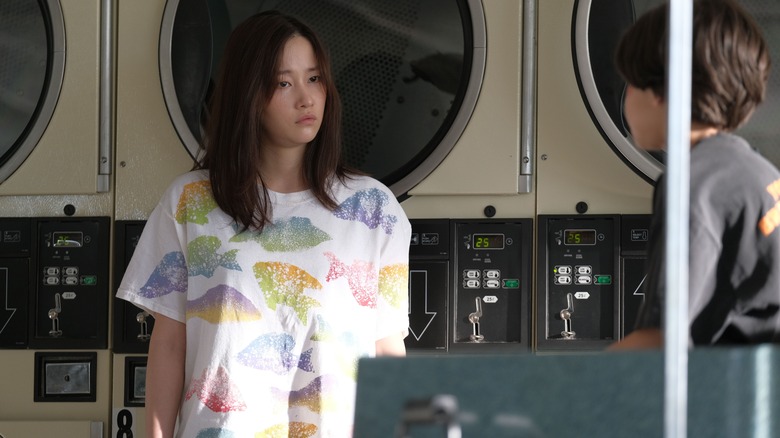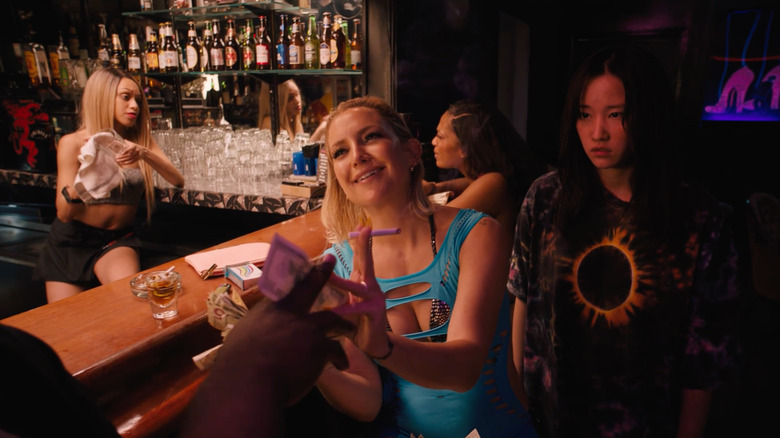Mona Lisa And The Blood Moon Director Ana Lily Amirpour Has Questions [Exclusive Interview]
"Mona Lisa and the Blood Moon" is, as expected from writer and director Ana Lily Amirpour, a trip. It's another dark fairy tale from the filmmaker. The original story follows the telekinetic titular character (played by Jeon Jong-seo) on a journey of highs and lows in the streets of New Orleans. It's about a person striving for freedom in a world that doesn't want her to have it, which is now a running theme in Amirpour's works.
The director behind "A Girl Walks Home Alone at Night" and "The Bad Batch" has made an unofficial trilogy about those trying to escape from under society's crushing thumb. That wasn't Amirpour's intention; it just happened. With only three movies, Amirpour has already established a style for herself, which emphasizes questions, not answers. Recently, the filmmaker told us about the questions she had on her mind when making "Mona Lisa and the Blood Moon."
'I'm safe in Vegas, and being alone isn't conspicuous in Vegas'
That's a great art piece behind you. Is that Jodorowsky?
Yeah. That's "Holy Mountain." A really dope "Holy Mountain" poster.
In your office, do you like to surround yourself with inspirations?
Yeah, I do. I certainly do. This is the spot, but I also have to leave sometimes. In my house, with writing especially, if I get to a point where I'm stuck or worn out or something, it's hard for me to get past it in my house. When I'm in my house, I default to my robotic "check the fridge, turn on the TV" stuff, and then I don't get anything done. Even social media sometimes can just take three hours. Then I'll go to a hotel and check into a hotel room for five days and suddenly I behave differently. I'm way more productive and I'll get past the hump, and then I can do it again in my house. But I have to get out of here sometimes.
Did you do any writing for "Mona Lisa and the Blood Moon” when you were in New Orleans?
I wrote it here [in my office] and then I would go and finish it in Las Vegas. I get a hotel room in Vegas. So far I've written most of my scripts there. I wrote "Mona Lisa" in the Encore Hotel in Las Vegas.
And Vegas isn't distracting at all?
I don't leave my room that much. When I'm there on those writing trips by myself, it's not like when I go to Vegas, if you were to go to Vegas with a friend. I'm really in the room 90% of the time. And then if I do need to go, get out, do a loop, I'll put my headphones on and walk around the casino, and sit for a second and have food or something. I'm just in and out. It's actually quite quiet if you stay in your room.
Most people that go to Las Vegas do not spend the majority of the time in their room. They don't want that. They want you in the casino spending money. I'm like, "Just try it, if you want to see." Everybody says that. They're like, "How can you concentrate in Vegas?" I'm like, "If you're in a room, it's actually dead quiet — dead-ass quiet."
Why a hotel in Vegas over any other city or town?
I actually did rent a house during Covid in New Orleans for a month and I was working and writing there as well. But that was more to get out of L.A., and it was Covid, and I just liked New Orleans. But the reason for Vegas, it's really about comfort and fear. I would be scared if I went to some middle of nowhere. If I went to a beach hotel, I don't think I'd be scared of the beach, but in the woods or something, I would just be worried about hillbillies and bears and stuff like that.
I'm safe in Vegas, and being alone isn't conspicuous in Vegas. If you walk around, it's like everybody — you could be there with a convention or ... that's the part, like nobody knows, everyone's just there. If I went to a beach hotel or somewhere, it's all couples. I just want to be undercover. No one's paying attention. I feel undercover in Vegas and safe.
When you went for walks in Vegas, what music were you listening to that inspired "Mona Lisa and the Blood Moon?"
A lot of the stuff that ended up in the movie. I write the stuff into the script. I have huge playlists when I'm writing movies. So what ends up in the movie is a much smaller curated version of it, because that's how I find music. I remember when I was first writing "Mona Lisa," I was listening to a lot of Orsten — I don't think anybody knows him. I think there's only one song in the soundtrack now with him. At the beginning I thought it would be more, but that was one of the first artists I was listening to when I was starting to think of "Mona Lisa," and Rodion, who ended up with a lot of stuff on the soundtrack.
Then it was through Rodion that I discovered Bottin, who has songs on the soundtrack. So it's like if you're exploring music, you can find more music through seeing who certain musicians collaborate with, who their producers are, and what record labels they're on. It's a treasure hunt. If you find one great artist through them, you can usually find five more.
'You just want all the answers at the end of an hour and a half? Really?'
So the question of the movie — at least the one I think it's worth asking — is, can you generally like people today?
I would love to know it. Can you?
I don't know. I used to be more optimistic. Was that a big question on your mind when making "Mona Lisa?"
It's always on my mind.
How do you feel about that question today?
It's a tough question. I don't like people a lot of the time, but when I do like a person, I tend to like them a lot. I don't midrange like the majority of people. I can't do it in a middle of the road way, so I feel like it's this extreme, like ... people are just at each other's throats and for nonsense reasons. People don't seem to be interested in gathering information from each other and understanding each other. People seem to be interested in categorizing each other and quickly dismissing each other.
I think that's becoming more and more the case with the internet and social media in the last eight years or whatever it's been. I think people are even blind to noticing how they've been hypnotized by it and trained into a new way of relating with each other. So yeah, I think it's a critical question. It's like, what are we going to become with this lack of being able to tolerate each other?
It's a scary question, but I appreciate the movie doesn't try to answer it. The story does kind of reflect the highs and lows you can feel about that question, though. Some moments and interactions are exhilarating and joyful, and the next moment, humanity's ugly face comes back.
Yeah. I think for this movie, especially for me, I was consciously needing to be optimistic. I needed to see that delicate little temporal friendship between her and that kid, allowing a moment of a safe place. When you find a friend who you get them and they get you, it's just a natural, easy, safe place. It's such a unicorn.
It's such a special thing to have a real friend and friendship. They go away. If you think back to childhood, these friends that your whole life was defined by for a year, or whatever period of time, and then it's gone. And then you'll meet someone else. And maybe some people don't serve you anymore. You know what I mean? It's not how it was, but it is a safe place. So there are those moments and those people that help you just have a moment of calm.
But then, yeah, you're back in the madness. I think the whole thing about the questions, and it's nice to hear you say you appreciate it — I feel like people, another thing they're impatient about, especially in movies is, you just want all the answers at the end of an hour and a half? Really? Look at this f***ing world. You really are so lazy and entitled that you think that a movie can't be as complicated as life is? Do you go to bed at the end of every day with all the answers?
And even in big movies, the answers are usually not as satisfying as the questions.
Yeah, but it can be satisfying. A good movie is a good movie. I loved "Top Gun: Maverick” and I thought it was just so fun. I cried and I just was so satisfied and grateful that Tom Cruise worked so hard to make those big popcorn movies that we don't really have anymore at that quality level. It does sum things up and gives you peace. It can do that, too. Movies can do anything, but sometimes I feel like people will be like, "Well, nothing is explained. I don't understand everything." And I'm like, "Well, yeah. You don't understand everything." It's exactly the point.
Or even just the need for backstory or exposition.
Oh, all the time. Again, it depends. It could be good. There are so many different movies. I have heard that from people sometimes, they're like, "How did she ... how are we going to figure out..." I'm like, "Hey, I'll make a sequel and you'll get a little more information."
It's the same thing, it's an hour and a half of a movie. How much can you know about anything? If you go to a grocery store and have an interaction with a cashier, you're going to know certain things just in that brief interaction, but you're not going to know everything. You know what I mean? It's an hour and a half, two hours. I watched the docuseries about Michael Jordan and I got a lot of information, but I still don't know everything.
I don't know everything about myself, so how could I know everything about everything in a two-hour movie? I think what's more interesting is what we don't know, and just the fact that you have questions. If you're starting to think about what the answers are to the questions, then it's still alive. If the question is answered, done, close the book, go get a hot dog. You know what I mean? But if it didn't, you're still like, "Whoa, what was that? What then?"
'When you're making a film, it comes from this almost subconscious need'
To your point, now I'm thinking about it, you can know someone your whole life and not have answers to what makes them tick.
That's right. Think of the people you're even closest to. Do you really, fully know them? Who do you know? I think the only thing we can try to attempt to fully know is ourselves, and that's a hard job. It's a full-time job. It's an all day, everyday job. So just trying to do that job is going to take all the weight. If everybody did that, I think everybody would be way better off. Instead of being like, "He's like this. Those people think this way. Those people are wrong. Everybody over there is s**tty. You don't agree with me." You know what I mean? Just go sit down with yourself and be like, "What's my problem? What do I like? What do I want to do?" Yeah, I don't know. This is getting really existential, though [Laughs].
[Laughs] It is, but strangely, it relates to the movie. Even though you have these questions about yourself, even three movies in, you seem to have a very clear sense of what you want to make and who you are as a director.
It is interesting at three movies in, because you do start to see the essence of yourself. I see that with all writers/directors, especially visual stylists. It's like if you are a visual stylist, a surrealist, and a fantastical type of a filmmaker, you'll see it. You'll see it. If you look at Wes Anderson, you're going to start to see what he likes to play with and stuff.
I can see very clearly. It's almost like psychoanalysis. It's weird because it's not conscious. When you're making a film, it comes from this almost subconscious need, the things that you're questioning about life and how you're interacting with the world and examining the world at that time, and everything like that.
So then in hindsight, when I look back, I think all of them, they're all — clearly the world and the system is the biggest antagonist for me. Freedom is the biggest agenda for me. Clearly, I feel like I'm an outsider from everything in a way, observing everything. Interacting and then retreating from everything in some strange way, because maybe no place I've seen or found yet fully makes sense. So I'd rather visit a lot of things, I think.
Yeah, that's the psychoanalysis thing where I'm looking at it and I'm like, "Oh, okay." So the first three films were almost a trilogy in a way.
But it doesn't sound like that was planned, so it just happened?
Yeah. It's weird. I'm only thinking this right now as you're asking, as I'm thinking of it all. It does oddly flow together. It's this Iranian, lonely, kind of weird thing, and then there's this American separated, bipartisan madness of consumption and decay. And then there's this joyful, madhouse carnival of life chaos that you just have to push through. And now, I guess, yeah, I think it's time to maybe punish some people, to turn it out. I'm really inward looking at myself, so I might turn my energy a little bit. I'm writing something now, so maybe my energy will turn a little bit to pointing out a little bit of wrongdoers.
'It's almost like you're just inside of a living thing you birthed and it's alive at that point'
Was "Mona Lisa" the story you were writing while editing "The Bad Batch?"
Yeah.
Whenever you're working on something new, is it a response to whatever you made last?
Yes, but this is a little different because Covid happened and I did write several scripts during that weird time warp. But none of them really became the thing. And it was a strange time shifting in what people are making and even stuff getting made. It's like a reboot. I feel like what I'm writing right now is a response to Covid and three years of sitting in this gestating in a strange time. Covid separated everyone even more, where I oddly thought, shouldn't this bring everyone together, something like this?
And if there is a message in the movie about that, it's just let people be.
Absolutely. But I don't see that happening.
I know we got existential, as you said, but I did want to ask you a technical question.
Yeah, yeah, please.
By the way, I had questions written down and then I reminded myself, just go with the flow and see what happens.
[Laughs] Okay, yeah. That's dangerous with me. I'm like, "Wait, what did we talk about? Okay."
[Laughs] Hearing about your process, it's clearly instinctual, but when you're on set, obviously that's very technical. Where do you find the middle ground between the technical process and your instincts on the day, when you're responding to what's in front of you but there are restrictions or limitations?
I love it. My favorite part of making the film is in production. It's like you spend all the time writing the script, rehearsing, prepping, building, doing everything, and then it's just happening. It's like, because it's all time, you have days and hours going, you find this rhythm. It is instinctual. It's not rigid. You have to be bendable.
I storyboard, so if you're asking technically, when I do, I know my locations, I know where I'm going to be and what I think would be a cool way to show it. Then I storyboard. So I have an idea of how those images could play with each other.
But then on the day, usually you don't have as much time for everything you thought you might, so you start to prioritize and you also see what the actors are doing. It's fun. I love it. It's almost like you're just inside of a living thing you birthed and it's alive at that point. It's pulling you in a way, and you just stay with it. Make sure you get everything. I love it. I feel the most alive during production, during shooting.
To end, whether it's "Cliffhanger" or something else, I look forward to your popcorn movie.
[Laughs] Yes, yes. Big or small popcorn, I'm all about it.
"Mona Lisa and the Blood Moon" is now playing in limited release and available on VOD.
